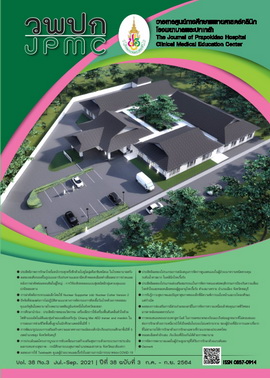The Effect of Promoting Spousal Support for Fatigue Management on Quality of Life among Primiparous Postpartum Mothers
Main Article Content
Abstract
BACKGROUND: Postpartum fatigue can occur from the first stage after childbirth with relating to physical, psychological and situational aspects. It is especially in novice mothers who lack experience in self-management in playing mothering roles such as raising children, doing housework and having roles of wife. Therefore, getting help from family members like husband is one of the important ways in reducing postpartum fatigue that may boost mothers’ quality of life.
OBJECTIVES: 1) To examine the level of postpartum fatigue among primiparous mothers. 2) To study the level of primiparous mothers’ quality of life. 3) To test the effect of promoting spousal support for fatigue management on quality of life among primiparous postpartum mothers.
METHODS: This quasi study was a two-group pretest - posttest design. Research participants were primiparous and having a normal labor in Prapokklao hospital. Purposive sampling was conducted for volunteers, and two similar sample groups were matched. The control group participated in usual care, while the experiment group participated in the four - step program. Research instrument was the program of promoting spousal support for fatigue management among primiparous postpartum mothers. Data were collected by personal information form, the postpartum fatigue questionnaire and the quality of life questionnaire among primiparous mothers.
RESULTS: This study included 26 participants in each control and experimental groups. The findings illustrated that the quality of life level in the experimental group was significantly higher than the control group at 0.05. The comparison of average score for postpartum fatigue between pre and post experiment phases was likely to decrease, but there was not significantly different both groups.
CONCLUSIONS: Enhancing the involvement of husbands in managing primiparous mothers’ fatigue can reduce tiredness and improve their quality of life.
Article Details
References
Pugh LC, Milligan R. A framework for the study of childbearing fatigue. ANS Adv Nurs Sci 1993;15:60-70.
Piper BF, Dibble SL, Dodd MJ, Weiss MC, Slaughter RE, Paul SM. The revised Piper Fatigue Scale: psychometric evaluation in women with breast cancer. Oncol Nurs Forum 1998;25:677-84.
Theerakulchai J. Factors related to fatigue and fatigue management among Thai postpartum women [dissertation]. Chaingmai: Chaingmai University; 2004.
Taylor J, Johnson M. How women manage fatigue after childbirth. Midwifery 2010;26(3):367-75.
Deeboonno A , Theeakunchai J , Khanobdee C. The effect of including spouse support in fatigue management program on fatigue of a wife who received cesarean section. Vajira Nursing Journal 2016;18(1):24-36.
Mortazavi F, Mousavi SA, Chaman R, Khosravi A. Maternal quality of life during the transition to motherhood. Iran Red Crescent Med J [Internet]. 2014[cited 2021 Jan 25];16(5):e8443. Available form: https://www.ncbi.nlm.nih.gov/pmc/articles/PMC4082526/pdf/ircmj-16-8443.pdf
Pugh LC, Milligan R, Parks PL, Lenz ER, Kitzman H. Clinical approaches in the assessment of childbearing fatigue. JOGNN 1999;28(1):74-9.
Mahatnirunkul S, Tantipiwatthanasakul W, Pumphisanchai W. World Health Organization quality of life Bref Thai. Chaingmai: Suanprung Psychiatric Hospital; 2002.
Kummoonta K, Kantaruksa K, Baosoung C. Effect of learning promotion in fatigue management among pregnant women. Nursing Journal 2012;39(4):59-70.
Tumchuae S, Plodpluang U. A development of breastfeeding promotion program by family support. J Prapokklao Hosp Clin Med Educat Center 2015 ; 32: 6-17.
Hemadhulin S, Theerakunchai J, Phumonsakul S. The effect of selected factors on quality of life among postpartum mothers. Vajira Nursing Journal 2016 ;18(1):37-50.
Fhunpayom S, Kantaruksa K, Baosoung C. Systematic review of fatigue management among postpartum women. Nursing Journal 2014;41:60-9.

